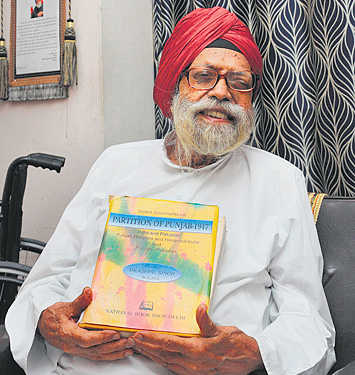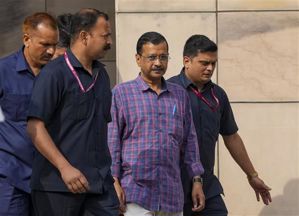
Prof Kirpal Singh with his seminal work on Partition. Tribune photo: Manoj Mahajan
Vishav Bharti
Tribune News Service
Chandigarh, August 11
The first chronicler of the Partition of 1947, who started building an archive in 1954, says not one of the key figures he interviewed during the process was ready to take responsibility for the monumental human tragedy that unfolded 70 years ago.
Now 93, Prof Kirpal Singh says he aims to “fix the responsibility” for the tragedy in his final work.
His journey in Partition’s historiography started in 1953 as a young lecturer at Khalsa College, Amritsar. Bhai Veer Singh called him, he recalls, and said that what happened in 1947 was unique. “It has never happened before, it will never happen again. I want to work on Partition but I am too old to do that. You write Partition’s history” — Bhai Veer Singh’s words still resonate for Prof Kirpal Singh, himself a victim of the tragedy.
(Follow The Tribune on Facebook; and Twitter @thetribunechd)
His assistant started visiting the refugee camps to document the stories of victims and Prof Singh himself started doing the rounds of offices in Shimla and Delhi to fish out records. This continued for two years.
The turning point came in 1962, when then Chief Minister Partap Singh Kairon offered to send him to the United Kingdom to collect papers related to Punjab.
Over six months, Prof Kirpal Singh got a chance to interview the leading figures connected with Partition — from Punjab Boundary Commission chairman Cyril John Radcliffe to Governor of West Punjab Sir Francis Mudie, to Prime Minister Clement Attlee to Mountbatten’s Chief of Staff Hastings Ismay.
Prof Singh met almost each architect of Partition while compiling his seminal work “Select Documents on Partition of Punjab”. After each interview, he said, he would jot down the excerpts in longhand. These documents are now part of the Punjabi University library in Patiala.
Prof Singh says Sir Francis Mudie, the Governor of West Punjab during Partition, was open to answer every question and allowed him to see his correspondence with Mountbatten, especially a letter written on July 25, 1962, in which the last Viceroy claimed that the number of deaths was exaggerated to defame him.
On the migration of people of Punjab, Mudie told him how Akali leader Giani Kartar Singh met him at Lyallpur and said that they (Sikhs) had decided to leave Pakistan.
In one interview, the then Chief Justice of India, Patrick Spens, accepted that Partition was a job done in a hurry by a man (Radcliffe) “who didn’t know the language of the people”. Neither did he have any knowledge of geography, nor did he have any clue about the people. “Nowhere in the entire British Empire the boundaries were drawn like that,” Spens told him.
More than six decades after meeting them, Prof Singh still regrets that none of the men “behind the Partition tragedy” were ready to take responsibility and conveniently put the blame on others.
“There was a design behind the idea of Partition. You won’t find that in documents, but I found about it during the interviews,” he says. “Now I have analysed all those interviews and am going to put together the entire analysis in a book,” he adds. Titled “Who is Responsible for Punjab Tragedy”, it would answer many unanswered questions of Partition, he says, adding that he has not spared “anybody”.
Amid the despair of Partition, he says the stories of hope are yet to be told. “People saved girls, collected dowry, also married them off. They sheltered them for years and later united them with families. Both sides saw such stories. The second part ‘Silver Lines in Dark Clouds’ comprises those stories.”


























